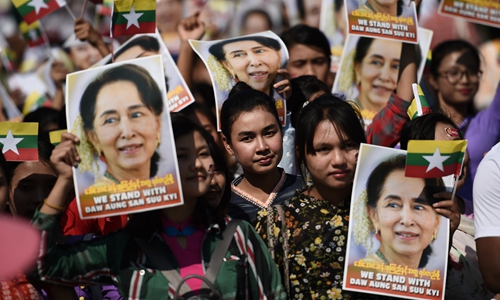HOME >> OPINION
Myanmar’s initiative can help end Rohingya row
By Bi Shihong Source:Global Times Published: 2019/12/15 16:33:39

People hold images of Myanmar's State Counsellor Aung San Suu Kyi during a rally in support of her, as she prepares to defend Myanmar at the International Court of Justice in The Hague against accusations of genocide against Rohingya Muslims, in Yangon on December 10, 2019. Photo: AFP
Myanmar's State Counselor and Foreign Minister Aung San Suu Kyi defended her country against accusations of genocide at the International Court of Justice (ICJ) at The Hague Wednesday. Some Western media outlets lashed out at the Nobel Peace Prize winner, accusing her of being the spokesperson for the massacre in Rakhine state in northern Myanmar. But inside the Southeast Asian country, which has been under the spotlight over the ethnic controversy for years, Suu Kyi enjoys widespread support. After the Myanmar leader's announcement to go to The Hague in November, hundreds of rallies were held in Yangon to show support for her. Domestic supporters said it was unfair for Western countries to put pressure on the Myanmar government led by National League for Democracy (NLD) and on Suu Kyi herself.That the Western countries have accused the NLD government of religious persecution has triggered resentment among Myanmese. In fact, the Rohingya issue has been a long-term political, historical, ethnic, religious, economic and social problem, with various interwoven factors, such as the immigration policy during British colonial rule, illegal cross-border immigration since the independence of Myanmar in 1948, poverty, as well as lack of rule of law and national security.
So far, successive governments in Myanmar have failed to find a proper solution to the thorny issue. After Myanmar's political transformation, the Rohingya issue has been widely discussed at home and abroad, and has also become a bargaining chip for political forces to fight for power and interests. The NLD government is confronted with immense pressure from all walks of life at home and from the international community which makes it even more difficult to deal with the Rohingya conundrum.
Though Western and Islamic countries frequently keep up the pressure on Myanmar on the Rohingya issue, officially, the country does not recognize the ethnic minority as citizens. Suu Kyi, once known as the "goddess of democracy" in the West, has been constantly blamed for staying silent on the plight of the Rohingya.
The political situation in Myanmar is far from stable after the political transformation, and the NLD government is hamstrung by various factors. The NLD has taken a relatively restrained attitude in dealing with relations with the military on the basis of Myanmar's domestic political situation since it came to power, for which Western countries argued that Myanmar's political transformation is not complete. They even accused the NLD government of conniving with the military for perpetrating atrocities. If Western countries continue to pressure Myanmar, especially through the trial at The Hague, the country's political transformation may possibly be scuppered, which may drag it into long-term turmoil.
The complicated Rohingya issue can only be resolved by promoting peace through development. Myanmar still faces many challenges in its delicate democratic transformation, which requires not only the country's own efforts, but also sustained support from the international community.
The NLD government should play the leading role in promoting national reconciliation and religious harmony, provide more effective political direction, as well as show political courage and wisdom to abandon narrow-minded Myanmese nationalism and embrace the Rohingya. Meanwhile, Myanmar needs to take various steps to resettle Rohingya refugees, develop various forms of assistance projects in the northern part of Rakhine state, where the ethnic minority lives. Efforts should be made to reduce poverty and promote development, so that the Rohingya can achieve self-sufficiency in areas populated by them. Thus, all ethnic groups can enjoy the benefits of economic and social development. Only in this way can Myanmar promote religious harmony and national reconciliation, reducing extremist ideology and achieving long-term stability.
Besides, the international community should cooperate with Myanmar, Bangladesh and other stakeholders to gradually solve the humanitarian crisis in the spirit of international concerns and in accordance with international law. The international community should also recognize the positive steps that the NLD government has taken to resolve the Rohingya issue, including working on refugee relief and resettlement in Rakhine state, building infrastructure, helping locals to develop agriculture and aquaculture, healthcare, employment and vocational training. Some of the endeavors have achieved results.
China proposed a three-phase solution to the Rohingya issue: realizing cease-fire, encouraging Myanmar and Bangladesh to keep in touch and strengthen communication, and addressing the root cause of the problem. China has called on the international community and all parties concerned to encourage and support the two countries, and has provided a lot of assistance, which is appreciated by both Myanmar and Bangladesh.
We hope that with its own efforts and support from the international community, Myanmar can embark on the road to harmony, stability, development and prosperity.
The author is a professor at Center for China's Neighbor Diplomacy Studies and School of International Studies, Yunnan University. opinion@globaltimes.com.cn
RELATED ARTICLES:
Posted in: ASIAN REVIEW